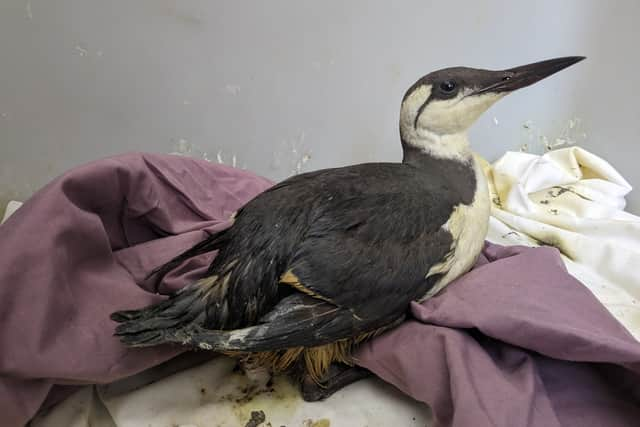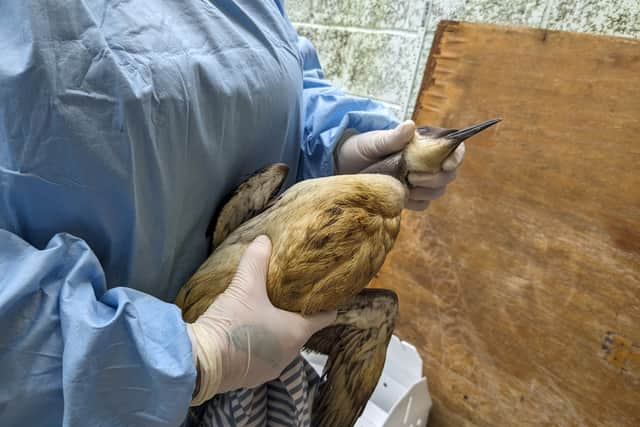RSPCA: Oil-drenched seabirds caught up in mystery spill may be 'just the beginning' - as it drifts east
and live on Freeview channel 276
RSPCA wildlife experts are caring for 15 seabirds caught up in a mystery oil spill, but they fear the oil-drenched birds might be just the beginning.
An emergency call came into the animal welfare charity last Friday (23 February), reporting birds who had been covered in contaminants following a spill off the Hastings coast. Rescuers went to collect the birds, and a total of eight guillemots, six razorbills and one gannet were rescued off the coast of East Sussex and Kent so far.
Advertisement
Hide AdAdvertisement
Hide AdThe birds have all been transported to RSPCA's Mallydams Wood Wildlife Centre, near Hastings, where the team have specialist equipment and skills for treating oiled birds. Oil is a huge hazard for seabirds and waterfowl, as it can quickly make their feathers less waterproof - leaving them at risk of dying of hypothermia.


The centre’s rehabilitation team is run by Richard Thompson, the UK’s leading oiled bird rehabilitation expert. Mr Thompson said the birds were now stable, and the Mallydams wildlife team were now hand-feeding and rehydrating them, until they were healthy enough to be cleaned.
"In the next few days we will wash the substance from the birds using our specialised facility. Once free of contaminants and given a clean bill of health, the birds will be released back into the wild, where they belong," he continued.


“We’re lucky to have decades of experience treating oiled birds, as well as specialised equipment to help treat them in a safe way. We’d urge anyone who sees an oiled bird not to attempt to rescue or treat them themselves, but to instead call the RSPCA for help.”
Advertisement
Hide AdAdvertisement
Hide AdMallydams Wood centre manager, Peter Smith, said that they had informed the Maritime and Coastguard Agency about the birds. “We’re very concerned these could be just the first of many birds that will be caught up in the contaminant spill and we’ve made emergency plans to rescue and treat any further birds who need our help.
“At the moment birds are being washed up across East Sussex and Kent and the slick seems to be moving across to the east. It’s incredibly alarming to see how many animals could be impacted by this," he added.
What should you do if you see the oil spill, or affected wildlife?
If you see any pollution or spills in the sea, you should report it to the UK's Marine Management Organisation on 0300 200 2024 (office hours) or 07770 977825 (out-of-hours). If you notice it upstream on an inland waterway (or even on land) you should call the Environment Agency’s 24-hour incident hotline on 0800 807060.
Any concerns about an animal which may have come into contact with oil or other contaminants should be reported to the RSPCA’s emergency hotline on 0300 1234 999 - which is open from 8am to 6pm. For advice on helping other injured or sick wildlife, please check the RSPCA website's wildlife page here.
Comment Guidelines
National World encourages reader discussion on our stories. User feedback, insights and back-and-forth exchanges add a rich layer of context to reporting. Please review our Community Guidelines before commenting.
